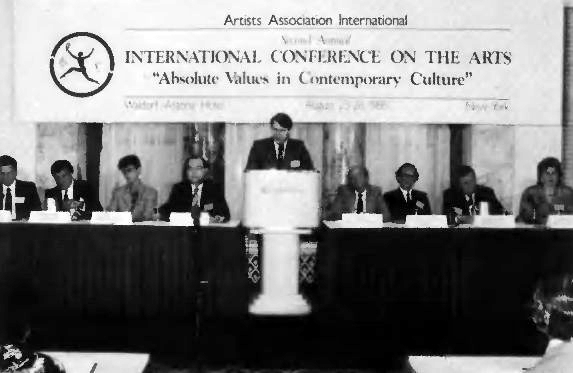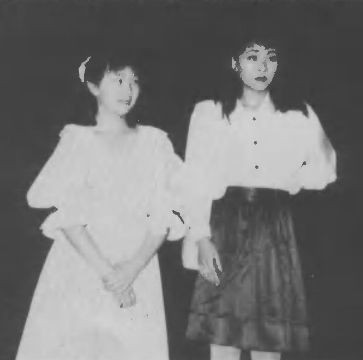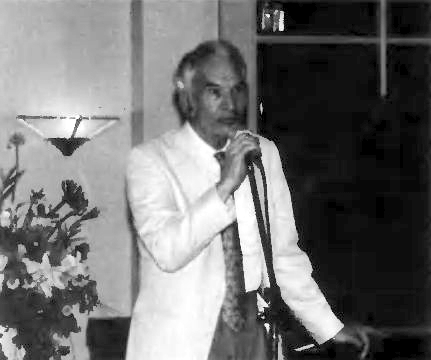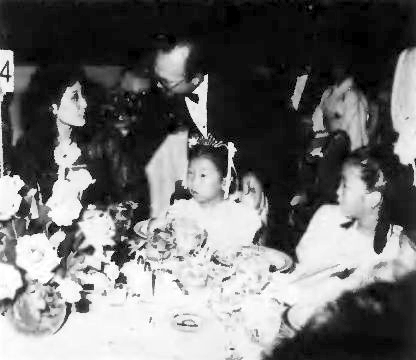![]()
The Words of the Lewis Family
|
|
The Words of the Lewis Family |

Featured
speakers at the opening plenary session
The artist has a "great potential to be a healer of society," declared Lorin Hollander, concert pianist, in his welcoming address at the Second Annual International Conference on the Arts. Sponsored by the Artists Association International (AAI), the conference was held on August 25-28, 1988, at the Waldorf-Astoria in New York City. Fifty-six distinguished participants, representing the many different aspects of the arts, gathered to discuss the conference theme "Absolute Values in Contemporary Culture."
This conference was founded by Father in 1986, and the first one was held in August 1987 in Paris. This year, as last, Dr. Bo Hi Pak, president of the Artists Association International, gave the opening plenary address, in which he outlined the aims of the AAI.
At the opening session, Edward Birdwell, general manager of the Seattle Symphony Orchestra, discussed his experience of the state of the American arts during his time in Washington DC with the National Endowment for the Arts. While many symphony managers had told him that money was a problem, "it's a lack of seeking for excellence, a lack of soul," he explained.
Other speakers at the opening session were Tsing Fang Chen, internationally renowned artist and lecturer, and Georgina Parkinson, ballet mistress of the American Ballet Theater.
In a luncheon presentation, Dr. Rene Berger, president of the International Association for Video in Arts and Culture, gave an overview of the impact of new technologies on the arts. The moderator of the conference was Herbert London, dean of the Gallatin Division of New York University.

Two
recipients of the Young Artists Scholarship Award. Left: Julie Kang,
first prize. Right: Reiko Watanabe, second prize
During the three main sessions, entitled "Striving for Absolute Values," "The Erosion of Absolute Values and the Responsibility of the Artist," and The Polemics of Art and Politics in Contemporary Culture," several speakers were featured. These were: Michael Gibson, art critic with the International Herald Tribune; Hugo Weisgall, composer; Dr. Tom Pniewski, professor at Hunter College; Dr. Jan Knappert, professor at the University of London; Robert Beck, who presented a paper by his wife Jill Beck, head of the dance division of The Julliard School, Kazuko Hillyer, international artistic agent; Ivan Nagy, dancer and director of the Cincinnati-New Orleans Ballet; and Richard Grenier, author and critic. Their topics touched on such themes as: the lack of standards in contemporary art, the suppression of the arts under communism, the universal qualities of poetry, the special attributes of artists, and the development of the values of an artist in the context of the family.
The keynote speaker at Friday's dinner was Arnaud de Borchgrave, editor in chief of The Washington Times, who spoke on "The Art of Survival." Quoting Winston Churchill -- If you don't stand for something, you'll fall for anything" -- he gave an overview of the current state of the worldwide conflict between liberal democracy and totalitarian communism. While he admitted that "we have come a long way from the days when the American flag was being burned in the streets," he felt that the major problem was now the national will, which was being undermined by "media censorship by omission" and the lack of a realistic global perspective in the legislative branch of government.

Dave
Brubeck, pianist and jazz legend, answers questions at a
lecture/demonstration of his work
The lunch on Saturday featured a unique presentation by jazz legend Dave Brubeck and his Quartet. He was introduced by Brian Saunders, executive director of AAI, who recounted his first experience of the "Brubeck experience and the crossover of jazz and classical," while completing his doctorate at Julliard. The Quartet explained that "the blues is the original fusion of musical culture -- that great meeting of African, European, and South American cultures," and then gave an exhilarating performance based on the blues that was rapturously received with a standing ovation.

Members
of the True Family attend the Gala banquet on Saturday night
Saturday evening welcomed over 400 people to a grand fundraiser for the "Young Artists Program." This program rewards the achievements of aspiring young artists worldwide with a stipend to further their education. Renata Scotto, opera soprano, and Lorenzo Anselmi, conductor, were the honorary chairmen of the evening, and two awards were presented this year.
Julie Kang was the recipient of the Young Artists Scholarship Award in violin. A brilliant 12-year-old Canadian of Korean descent who has already performed as soloist with the Vancouver and Edmonton Symphonies, she gave a beautiful performance that clearly demonstrated her mastery of her chosen instrument.
The Young Artists Debut Award for piano was presented in abstentia to Alexander Paley, who has recently come from the Soviet Union. He has been a regular soloist with the Moscow Virtuoso Orchestra and has won the J. S. Bach International Competition in Leipzig. He was unfortunately unable to attend.
His inability to attend and thereby display his talent was made up for by a magnificent performance by Lorin Hollander. This was followed by the delightful "Moonlight pas de deux" from The Blindman's Daughter (Shim Chung), a ballet presented by the Universal Ballet Company (UBC) at the Seoul Olympic Games. The performers were Julia H. J. Moon (Hoon Sook Nim), the principal dancer with UBC, and Ross Stretton, a principal dancer with the American Ballet Theater. Every single one of the True Children was in attendance at the gala, the first time they had been all together at a major conference.
Tobian Leibovitz, owner of The Ballet Shop, the center of the ballet world in New York City, was heard to comment on how beautifully Julia Moon's talent "had matured and been perfected" and that she was "a tremendous credit to the choreographer Adrienne Dellas."
The final event of the evening allowed everyone to display his or her own dance talent on the floor to the music of the Peter Duchin Orchestra.
The conference ended with lunch on Sunday and closing remarks by Dr. Pak. He explained that the purpose of the conference and, he hoped, the purpose of the participants, was "to advance the cause of idealism in the arts emotionally, intellectually, and technically" and that "our search for absolute values has begun."
Next year's conference will be held in London.